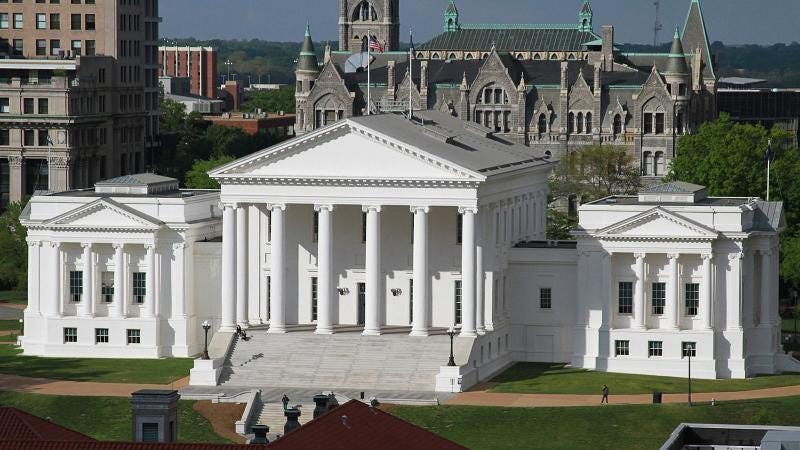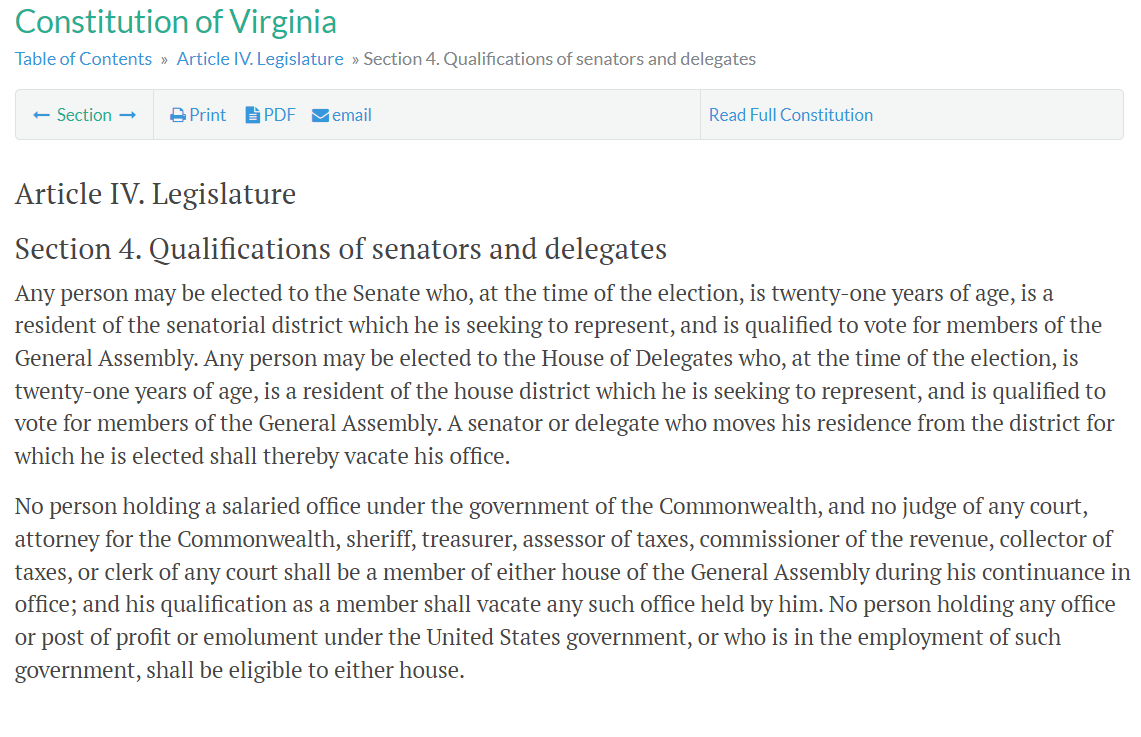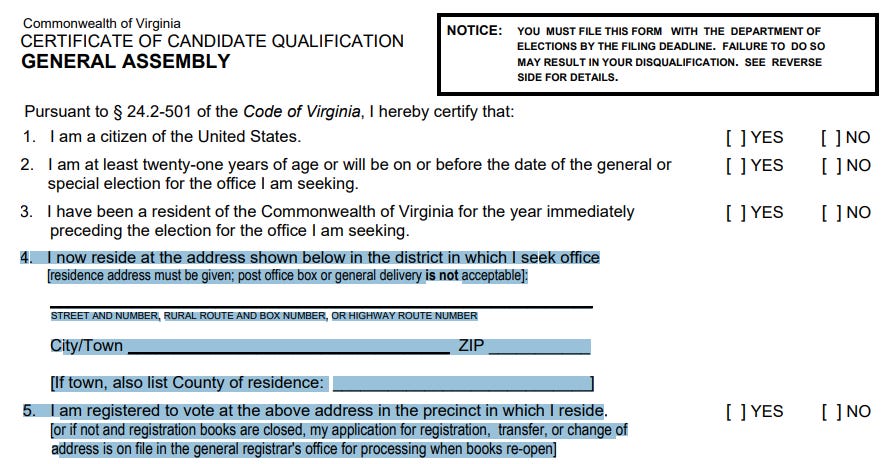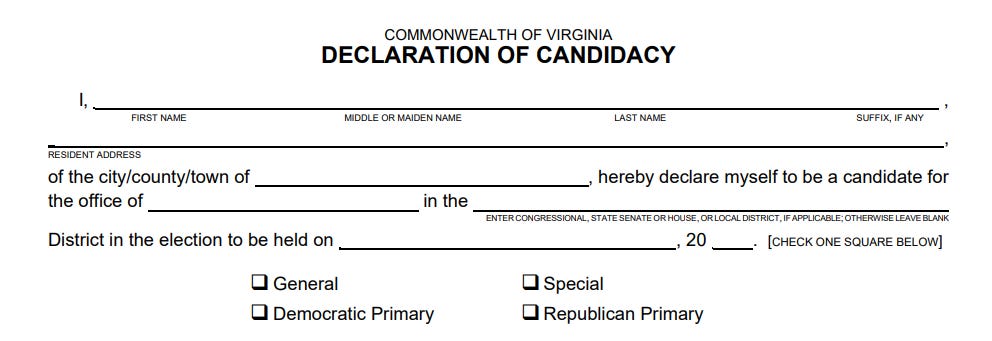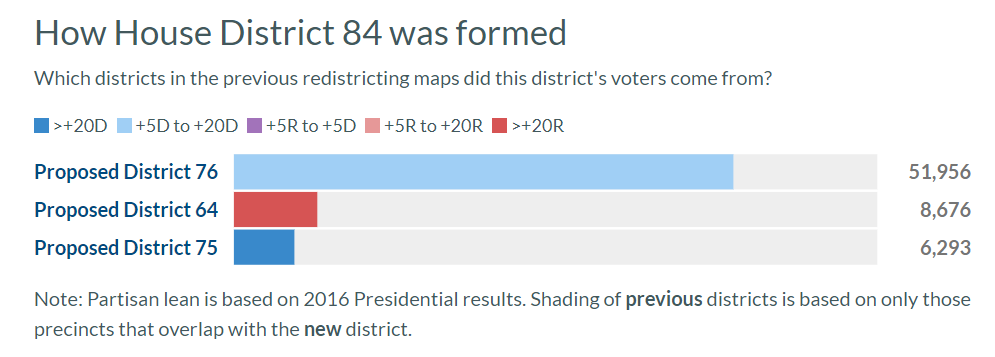Can General Assembly Incumbents Legally Serve in Reconvened (Veto) Session?
Stanfield looks at Hampton Roads incumbents.
This is a daily newsletter covering Virginia politics from top to bottom. Please consider becoming the ultimate political insider by supporting non-partisan, independent news and becoming a paid subscriber to this newsletter today.
Have a tip? You can reply to this email, or email me directly at Brandon@virginiascope.com
Today’s Sponsor: AFP-VA
“AFP Virginia is having events across the state highlighting our Pathway for Virginia’s Future and the progress we made this legislative session. We’ll be inviting legislators to celebrate the work they did to help build the future Virginians’ deserve. Join us at an event near you to meet your legislator(s) and learn more about what AFP Virginia worked on this session and what we’re building for throughout the year.”
Can General Assembly Incumbents Legally Serve in Reconvened (Veto) Session?
By Josh Stanfield of Yorktown, Va.
Since the General Assembly session ended, there’s been a “flurry” of retirements from Virginia legislators, lifting the spirits of proponents of a new politics for Virginia. This same exodus from the General Assembly has also triggered some to lament the loss of centuries of legislative experience and - privately - the loss and reconfiguration of patronage.
Meanwhile, the remaining incumbent legislators are playing musical chairs with fewer players and the same number of seats. There is, however, a potentially pesky obstacle that could complicate their plans: the Constitution of Virginia. Last year Delegate Mark Sickles told reporter Graham Moomaw “I think it’s making some people nervous.”
Article IV Section 4 of the Constitution of Virginia unambiguously states: “A senator or delegate who moves his residence from the district for which he is elected shall thereby vacate his office.”
The problem emerges for legislators who need to move out of their old House or Senate districts in order to move into new districts in time for the June 20, 2023 state-run primary - in fact, in time for the April 6 filing deadline for the state-run primary. If they move to a location outside of their old district, the Constitution of Virginia clearly states that they vacate their seat (and thus cannot serve in the April 12 Reconvened Session or subsequent 2023 special sessions). If they move into a residence within both the old and new districts, the problem doesn’t exist.
While Republicans have more latitude here in that they can hold party-run nominating processes for the General Assembly, Section 7.2 of the Democratic Party of Virginia Party Plan requires their committees to use the state-run primary process for General Assembly nominating contests (with a couple of exceptions).
For candidates intending to run in the June 20 primary, the last day to file is April 6. Two of the filing forms require candidates to swear (before a notary) to their residence address.
SBE 501(6), the Certificate of Candidate Qualification, requires a candidate to list their residence.
SBE 505/520, the Declaration of Candidacy, also requires a residence.
Since I live in Hampton Roads, I pulled the public Statements of Organization from the Virginia Department of Elections website for all of the incumbents in my region. After analyzing the Statements of Organization of 26 incumbents - and then inputting their addresses into VPAP’s search portal to determine their new districts - I found two red flags in Hampton Roads.
Democratic Delegate Nadarius Clark (currently representing the old House District 79):
When I input the address under “candidate information” from Delegate Clark’s Statement of Organization (amended 3/31/21) into the VPAP search, it shows his address is not in the new House District 84 where he’s currently running. Even more, VPAP’s analysis of the new House District 84 shows which old House districts comprise the new district. Note that there’s apparently no overlap between Del. Clark’s old House District 79 and the new House District 84.
*Update: Virginia Scope obtained a picture Monday that shows Clark listing his address in the new HD-84 on signature petitions.
Republican Del. A.C. Cordoza (currently representing the old House District 91):
Delegate Cordoza also listed an address under “candidate information” on his Statement of Organization that, when checked via the VPAP search earlier this week, is not in the new House District 86 in which he’s currently running. Between the time of my search and the time of publication, however, Delegate Cordoza has submitted an amended Statement of Organization that does place him in what appears to be an apartment in both the old House District 91 and the new House District 86.
I only did an exhaustive search for incumbents in the Hampton Roads region, though I did find that Delegate Delores McQuinn of Richmond faces a situation similar to that of Delegate Cordoza before he moved.
Ultimately, who is responsible for ensuring the Constitution of Virginia is followed and members of the General Assembly actually live in the districts they’re representing? Could the Attorney General initiate action under the Voting Rights Act of Virginia? While there’s apparently a constitutional question, it’s not clear who would have standing to bring it before a court. It’s also understood that it's the General Assembly’s prerogative to deal with their own rules and members.
Delegate Dawn Adams’ HB 1518, left this year in the House Rules Committee, would have required “each member of the General Assembly to annually submit a certification of his legal residence to the clerk of the house in which he serves, signed by the member under penalty of perjury to be true and correct” and provided an explicit process for vacating office. But the bill died a quiet death, unnoticed by the press or the public.
So as the incumbent legislators shuffle behind the scenes - and the music keeps playing - Virginians get to wait. When the music stops and the politicians settle into their new seats, we’ll be told who's appearing on our ballots. Then and only then is it our turn, as we cast our votes in a moment of fugitive democracy, leaving the rest to legislators who recede back into the shadows.





